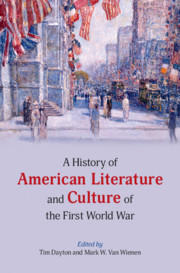Book contents
- A History of American Literature and Culture of the First World War
- A History of American Literature and Culture of the First World War
- Copyright page
- Contents
- Figures
- Contributors
- Acknowledgments
- Introduction America’s Great War at One Hundred (and Counting)
- Part I Genre and Medium
- Part II Settings and Subjects
- Chapter 9 The Peace Movement
- Chapter 10 Americans in France
- Chapter 11 German Americans
- Chapter 12 The English in America
- Chapter 13 Preparedness
- Chapter 14 Propaganda
- Chapter 15 Conscientious Objectors
- Chapter 16 Volunteers
- Chapter 17 African Americans
- Chapter 18 In the Midwest
- Chapter 19 In the South
- Chapter 20 Revolution
- Chapter 21 Monuments and Memorials
- Part III Transformations
- References
- Index
Chapter 16 - Volunteers
Ambulance and Nursing Narratives
from Part II - Settings and Subjects
Published online by Cambridge University Press: 23 January 2021
- A History of American Literature and Culture of the First World War
- A History of American Literature and Culture of the First World War
- Copyright page
- Contents
- Figures
- Contributors
- Acknowledgments
- Introduction America’s Great War at One Hundred (and Counting)
- Part I Genre and Medium
- Part II Settings and Subjects
- Chapter 9 The Peace Movement
- Chapter 10 Americans in France
- Chapter 11 German Americans
- Chapter 12 The English in America
- Chapter 13 Preparedness
- Chapter 14 Propaganda
- Chapter 15 Conscientious Objectors
- Chapter 16 Volunteers
- Chapter 17 African Americans
- Chapter 18 In the Midwest
- Chapter 19 In the South
- Chapter 20 Revolution
- Chapter 21 Monuments and Memorials
- Part III Transformations
- References
- Index
Summary
Many of the most vivid American accounts of the First World War were written not by front-line troops, but by non-combatant volunteers who witnessed the conflict as nurses, aid-workers or ambulance drivers. Drawn to the war-zone by a humanitarian desire to serve, or simply by the lure of adventure, these volunteers often came to feel a sense of unease at their own complicity in the machinery of war, and developed a powerful sense of detachment from the military systems within which they worked. This chapter explores a range of such writers, noting how early war memoirs established repeating tropes that would be adapted and subverted by later more nuanced responses to the war. For some, the insight generated by these wartime experiences, and the verbal skills required to articulate them, would inform a lifetime of literary production.
- Type
- Chapter
- Information
- Publisher: Cambridge University PressPrint publication year: 2021

